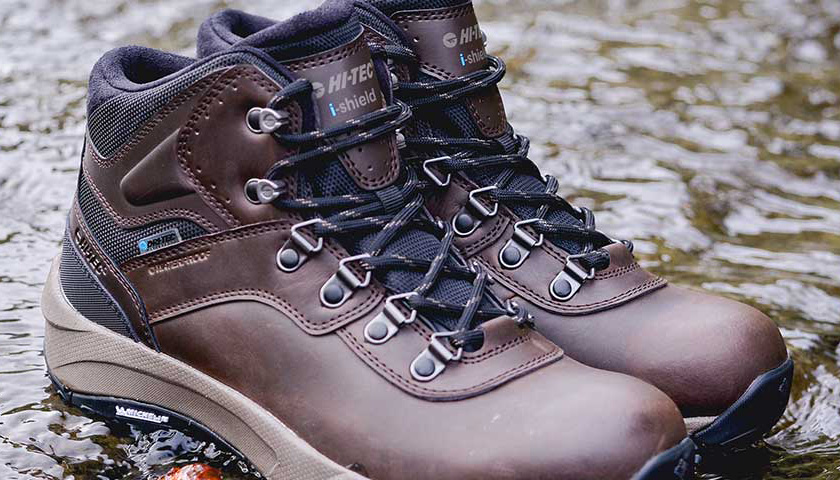Purchasing hiking footwear can be quite a daunting task. At Outdoor Adventures Store we are always on hand to help our customers to ensure that the footwear they choose is sturdy, reliable, comfortable and great value for money. We are pleased to answer some of the more usual questions about buying hiking boots.
Do I need hiking boots?
Yes! You do. You need hiking shoes and boots if you want to trek long distances and upland trails comfortably and without blisters or wet feet and all the time reducing the dangers of slipping and falling. A good pair of hiking boots are optimised for ankle support on all terrains and will protect your feet from rocks and spikey trail debris. There is a good reason why Mountain Rescue sites repeatedly recommend wearing proper footwear to ensure comfort and safety while hiking. The wrong shoes are simply a recipe for disaster. Those who start walking in regular footwear, often regret their decision quickly.
Should hiking boots be a size bigger than your usual shoe?
A controversial question indeed! Some manufacturers recommend going a half size up, but this is not always good advice. The answer is very simple. Check your foot size, length, width and arch and then purchase a boot that will fit snugly everywhere. Look out for tight or squeezed spots and know that this is going to be the source of extreme pain in the future if you walk in that boot. You should be able to wiggle your toes. If the boot is too loose and your foot will slip on down-hill trails, causing your toes to touch the end of the shoes and cause discomfort or even injury. You are also likely to get blisters. Consult the sales advisor at your store. A general guide is that your heel should be locked in position inside the boot and won’t slide or move, as you walk. At Outdoor Adventure store, we can advise at the fitting stage, ensuring a hiking boot that will keep you comfy, safe and happy for years to come.
Do hiking boots stretch?
Hiking boots may stretch a little with wear, but this is more a case of them becoming snug, and fitting better, after you ‘break them in’ and not a case of the boots expanding to become too loose. Leather is a natural material which responds to outside (and inside) conditions. Stretching or easing, may happen to your boots of natural materials.
Can I wear hiking boots for regular walking?
Yes. Hiking shoes and boots are designed for walking long distances so are perfect for regular walking. However, if walking on a hard road surface, in the sturdier, heavier hiking boots it may make the going a little tough. In fact, you will be using more energy to cover the same distance. A lighter walking shoe or trail runner is probably better suited for road walking.
Can I use hiking boots for running?
It is not advisable to use a heavy hiking boot for trail running. Trail running has become increasingly popular over the past few years. For this activity, it would be advisable to choose the aptly named, trail runner, if running over bumpy terrain in isolated areas is your choice of outdoor fun. Trail runners have no high ankle supports and are generally of a lighter material. Generally, they have a narrow sole, so you are closer to the ground, reducing the chances of tripping and falling. Naturally, they are not as durable as sturdy trekking boots and will not offer the same amount of protection from debris, stones and rocks. But each boot or hiking shoe has been optimized for its designated activity.
Do I need to spend a lot of money on hiking boots?
There is no need to spend lots of cash on your first pair of hiking boots. There are a wide range of hiking boots to choose from and even those with a modest price tag offer comfort, safety and reliability on the hiking trail. Of course, a lot depends on the type of hiking you intend to do. If you are into extreme trekking at ridiculously low or unbearably high temperatures, then you will need to adjust your purchases to reflect the stress that you and the footwear will be experiencing. If you are just new to the world of hill-walking, then you can purchase a good pair of sturdy, breathable, waterproof shoes to get you comfortably on the trail. Outdoor Adventure Store shops have an incredible choice of activity footwear and can advise on what meets your needs. Take on the trails in the Eurotrek Lite III Walking Boot by Hi-Tec. Waterproof and lightweight – they boast a Dri-Tec membrane at a very reasonable price.
How long should hiking boots last?
This question can be answered by the previous one. Sometimes, you get what you pay for. Cheap shoes will last just a while. Expensive, branded and tested hiking boots are more likely to be durable and hard wearing. Some people have trusted boots for years and years. A good guideline for quality hiking boots and trail shoes is some 500-1000 miles (805 to 1610 km). We know that is a huge range but there are many factors affecting the mileage that your boots can handle. The terrain is very influential and firm, but soft trails, will see your boots lasting longer than those that tackle rock, bogs and scree. Clearly, the boots will just take less of a beating on nice even trails as opposed to tough and challenging terrain. Maintenance and care of the boots will also extend or lessen their lifespan.

